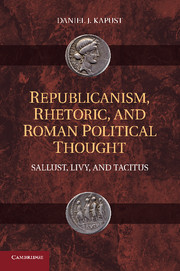Book contents
- Frontmatter
- Contents
- Acknowledgments
- 1 Introduction
- 2 An Ambiguous Republican
- 3 Channeling Conflict through Antagonistic Rhetoric in the War with Catiline
- 4 Exemplarity and Goodwill in Livy's From the Founding of Rome
- 5 Tacitus on Great Men, Bad Rulers, and Prudence
- 6 Tacitus' Moral Histories
- Epilogue
- Bibliography
- Index
- References
5 - Tacitus on Great Men, Bad Rulers, and Prudence
Published online by Cambridge University Press: 03 May 2011
- Frontmatter
- Contents
- Acknowledgments
- 1 Introduction
- 2 An Ambiguous Republican
- 3 Channeling Conflict through Antagonistic Rhetoric in the War with Catiline
- 4 Exemplarity and Goodwill in Livy's From the Founding of Rome
- 5 Tacitus on Great Men, Bad Rulers, and Prudence
- 6 Tacitus' Moral Histories
- Epilogue
- Bibliography
- Index
- References
Summary
INTRODUCTION
We have seen in discussing Sallust and Livy that each sought to navigate the tensions and conflicts that emerged in the political community in different ways. Sallust's Rome, characterized by competition and antagonism, had been constrained by fear. With fear removed, the competitive and antagonistic energies of Rome threatened to become destructive, but the process and practice of antagonistic rhetoric offered hope for these energies' treatment and expression, however contingent and temporary this treatment and expression may have been. In Livy, by contrast, we saw the importance of consensualism and harmony, created through the display and observation of action and character, with goodwill functioning to bind the political community together. The rhetorical construction of leadership was central to achieving a vital and healthy republic, negotiating conflicts that emerged partly as a result of difference and inequality.
We are now moving, however, to a very different context, one in which the republic as a system of participatory government was not simply a memory, as it was for both Sallust and Livy, but a distant memory. This entails, as we shall see, not just changes in how the relationship of rhetoric to politics and power can be theorized, but also changes in what free action and speech might mean. We might expect such changes to have attended the displacement of participatory government by monarchical government, given both what we have seen of contemporary discussions of republican liberty and its connection to participatory government, on the one hand, as well as the broader link between rhetoric, persuasion, and participation, on the other.
- Type
- Chapter
- Information
- Republicanism, Rhetoric, and Roman Political ThoughtSallust, Livy, and Tacitus, pp. 111 - 140Publisher: Cambridge University PressPrint publication year: 2011



